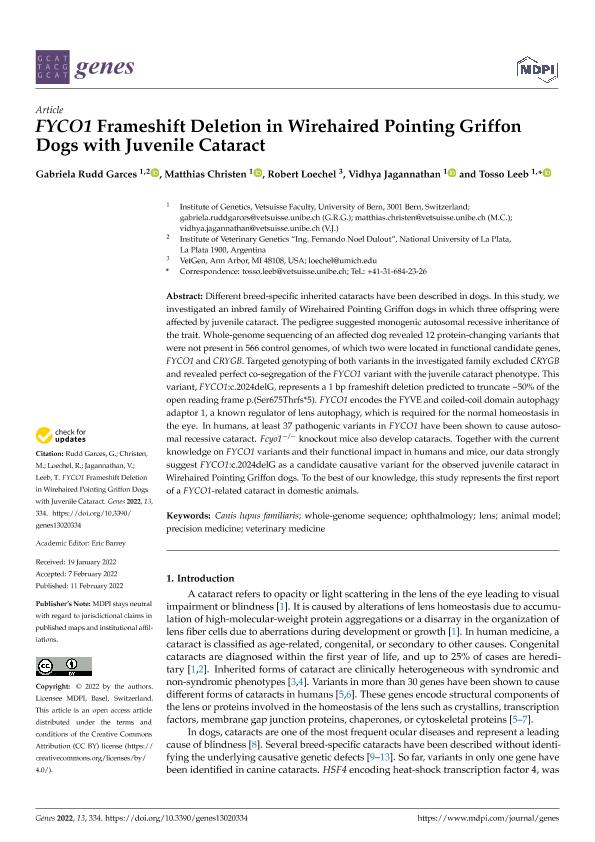Artículo
FYCO1 Frameshift Deletion in Wirehaired Pointing Griffon Dogs with Juvenile Cataract
Fecha de publicación:
02/2022
Editorial:
MDPI
Revista:
Genes
ISSN:
2073-4425
Idioma:
Inglés
Tipo de recurso:
Artículo publicado
Clasificación temática:
Resumen
Different breed-specific inherited cataracts have been described in dogs. In this study, we investigated an inbred family of Wirehaired Pointing Griffon dogs in which three offspring were affected by juvenile cataract. The pedigree suggested monogenic autosomal recessive inheritance of the trait. Whole-genome sequencing of an affected dog revealed 12 protein-changing variants that were not present in 566 control genomes, of which two were located in functional candidate genes, FYCO1 and CRYGB. Targeted genotyping of both variants in the investigated family excluded CRYGB and revealed perfect co-segregation of the FYCO1 variant with the juvenile cataract phenotype. This variant, FYCO1:c.2024delG, represents a 1 bp frameshift deletion predicted to truncate ~50% of the open reading frame p.(Ser675Thrfs*5). FYCO1 encodes the FYVE and coiled-coil domain autophagy adaptor 1, a known regulator of lens autophagy, which is required for the normal homeostasis in the eye. In humans, at least 37 pathogenic variants in FYCO1 have been shown to cause autoso-mal recessive cataract. Fcyo1−/− knockout mice also develop cataracts. Together with the current knowledge on FYCO1 variants and their functional impact in humans and mice, our data strongly suggest FYCO1:c.2024delG as a candidate causative variant for the observed juvenile cataract in Wirehaired Pointing Griffon dogs. To the best of our knowledge, this study represents the first report of a FYCO1-related cataract in domestic animals.
Archivos asociados
Licencia
Identificadores
Colecciones
Articulos(IGEVET)
Articulos de INST.DE GENETICA VET ING FERNANDO NOEL DULOUT
Articulos de INST.DE GENETICA VET ING FERNANDO NOEL DULOUT
Citación
Rudd Garces, Gabriela; Christen, Matthias; Loechel, Robert; Jagannathan, Vidhya; Leeb, Tosso; FYCO1 Frameshift Deletion in Wirehaired Pointing Griffon Dogs with Juvenile Cataract; MDPI; Genes; 13; 2; 2-2022; 1-8
Compartir
Altmétricas




